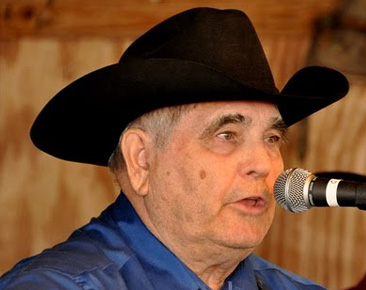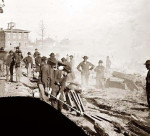
The song Atlanta Is Burning is based in part on an event during the American Civil War. It was written by Aubrey Holt of the Boys from Indiana, a band that Holt along with his uncle, Harley Gabbard formed in 1973.
“I wrote (the song) in 1974 after watching the movie Gone With The Wind for the first time. I had heard so much about the movie and it certainly lived up to everything I had heard about it. It hit me really hard and the next morning I wrote Atlanta Is Burning.
I was not particularly into Civil War things…I guess the movie just inspired me to write. That’s the way most of my songs come…I have to be inspired by something. Atlanta became our most requested song as we toured the festival circuit for 20 some years.”
From the band’s inception, the Boys from Indiana was one of the most original bluegrass bands on the festival circuit. The core of the band was comprised of the three Holt brothers; Aubry (guitar, bass and vocals), Jerry (bass and vocals), and Tom (bass, guitar mandolin and vocalist). They were joined by Dobro®-playing uncle Harley Gabbard.
The original line-up also included fiddler Paul “Moon” Mullins, and Noah Crase on banjo.
Aubrey Holt’s songs, whether they be sacred or secular, were a very important feature of the band’s repertoire right from the start. Holt’s writing was so prolific that, by the late 1970s, he had contributed half of the songs on their first five albums.
Additionally, their tight vocal harmonies made the Boys from Indiana very popular with audiences.
Holt’s songs depict the country people who moved from rural areas to urban cities to make a living in the Midwest, while still holding dear the music and memories of home.
The battle for Atlanta, the Gate City of the South, came at the end of a series of brutal battles on the western front of the Civil War.
From Chattanooga, Tennessee, to the banks of the Chattahoochee River, General William Tecumseh Sherman’s federal forces battled with the Confederate army, commanded by General Joseph Johnson, to take every bloody mile in the sweep towards Atlanta, which by 1864 was second only to the capital Richmond in importance to the ailing Jefferson Davis-led government.
Utilizing various strategies Sherman outwitted the defensive Johnson, gaining ground first by swinging to the enemy’s left, then after a feint to the left, went right to find a relatively undefended stretch of river and crossed just eight miles from Atlanta against very little resistance.
Before long, Davis became so disenchanted by Johnson’s retreat – this time to Peachtree Creek, just five miles from the city – that he replaced him with the more aggressive General John Bell Hood. If Atlanta was going to fall to the Yankees, it would only do so after a good fight.
 In three battles over eight days, Hood beat off Sherman’s advances, but in the process he suffered 15,000 casualties, 150% more than the opposition. At this point Sherman began a siege of Atlanta, launching long range artillery fire as inhabitants of the city began to flee.
In three battles over eight days, Hood beat off Sherman’s advances, but in the process he suffered 15,000 casualties, 150% more than the opposition. At this point Sherman began a siege of Atlanta, launching long range artillery fire as inhabitants of the city began to flee.
In the first part of August each of the forces tried futile attacks on the other’s rear, and the Union infantry probed unsuccessfully toward the railroad south of Atlanta. Then on August 26 the blue corps suddenly disappeared, thought by Hood to have retreated when in fact they had marched south to cut across both roads and rail beyond the Confederate defenses.
When realization hit Hood he launched an assault but the Yankees were too strong and the rebels were repulsed with heavy losses. The following day, Sherman counter-attacked, mauling the rebels.
On September 1 Hood evacuated Atlanta torching everything in the city that was of military significance, and was government sensitive.
On September 2 Sherman’s army entered Atlanta. In less than four months and at the cost of 31,000 casualties the heart of the South had been taken.
On November 15, 1864, General Sherman gave orders to burn all public buildings, machine shops, depots, and arsenals in Atlanta. While setting out for Savannah that same day Sherman stated, “Behind us lay Atlanta, smouldering and in ruins, the black smoke rising high in the air and hanging like a pall over the ruined city.”
Gone With The Wind was a 1939 epic block-buster adapted from the book of the same name written in 1936 by Margaret Mitchell. It starred heart-throbs of the day Clarke Gable (playing the part of Rhett Butler) and Vivien Leigh (Scarlett O’Hara).
Atlanta Is Burning
© Aubrey Lee Holt
(Lemco Music Publishing Co., BMI)
Two years we’ve been fighting though it seems like a hundred
Away to the south there’s a home I once knew
Where my loved ones are waiting for a word from the Captain
That the battle has ended for the gray and the blue
I left dear old Georgia on the first day of April
The grass in the valley was just turning green
I married my Sally just a week before leaving
We now have a baby that I’ve never seen
She wrote me a letter that told of our baby
He’s just like his daddy is the words that it said
But that’s been so long now that it seems like forever
And Lord I’m so homesick I wish I were dead
Atlanta is burning the horizon is flaming
The thunder of cannons in the distance I hear
I think of my Sally and the son that she gave me
If I could just see her and the baby so dear
A bullet has found me and the darkness is falling
The pain is unreal and my body so weak
The Captain is calling but I cannot answer
My thoughts wander southward as I go to sleep
My thoughts wander southward as I go to sleep
Copyright reserved.
In this video clip Aubrey Holt explains how he “dug up” Atlanta Is Burning ……








